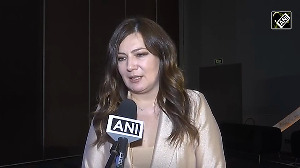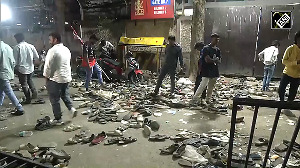
He has to demonstrate the ability of his government to take a quantum leap, almost tantamount to setting the Ganga on fire, in the next six months, if not in 100 days, if the people were to take seriously the cascade of commitments spewing out of the President's address to both Houses of Parliament on June 9, says B S Raghavan.
The manner in which former United States President Franklin Delano Roosevelt turned back the menacingly advancing tide of economic depression in the 1930s by putting in place radical policy measures within the first 100 days of his assuming charge has made that number all over the globe a magic benchmark for every government that gets a new start under a new leader.
The idea is to implement, within that period, proposals that would so capture the people's imagination as to give the government a flying start and generate enough momentum to last until the end of its tenure leading to greater achievements.
In this respect, Prime Minister Narendra Modi starts off with two unparalleled advantages: one, he has the majority necessary to make for a stable government and the leeway and leverage to put into effect whatever policies he considers to be essential for the good of the nation. And the other, an impressive mastery of the art of communication distinguished by clarity of thinking, cogency and elegance of expression, convincing exposition and emphasis on purposeful and time-bound action.
As a lifelong student and practitioner of management and public administration, as one who has observed a number of leaders in politics and corporates in action in India and abroad, and as one who has been closely following Modi's campaign from September 2013, I can say that he is the best that has happened to India after Independence. This may look like extravagant praise, but, in my view, highly deserved.
Modi has asked for suggestions for the next 100 days and he must have already been flooded with them from every quarter. From what we by now know of Modi's proactive personality, we can be sure that he would have drawn up for himself a menu of measures to be executed in the immediate, short, medium and long terms.
There is so much distrust and unwillingness to lend credence to whatever any government or politician says that Modi has an uphill task ahead. Indeed, he has to demonstrate the ability of his government to take a quantum leap, almost tantamount to setting the Ganga on fire, in the next six months, if not in 100 days, if the people were to take seriously the cascade of commitments spewing out of the President's address to both Houses of Parliament on June 9.
To this end, I want to put forth five propositions which, I think, are doable, and which would make a dramatic impact:
1. Doing a Nixon for solving India-China border dispute
The vista stretching before India and China, if only they join hands and march in step, is unparalleled in its grandeur. There can be no match to the combined synergy of two oldest civilisations, accounting for more than one-third of the human race, with cultural links going back to the time China came under the spell of Buddhism, acknowledged on all hands to be the emerging superpowers of the future.
The very sight of their standing forth on the world stage with unity of purpose and single-minded pursuit of common goals will usher in a new golden era of peace, progress and prosperity for the entire world.
Thus, a benevolent, all-powerful genie is waiting to be released from the bottle, but is being held back for one reason alone: The unresolved border issue between both the countries.
It is no use pretending that groups of officials, going by whatever high-sounding appellations, will ever be able to untangle the tangled skein of the India-China border which had been ill-defined, un-demarcated and disputed from as early as the 19th century.
No amount of time spent on study of maps, delving into treaties, dissecting of minutes of discussions, or poring over proceedings of conferences will be of help in establishing or demolishing with finality whatever claims are made.
Beyond a scintilla of doubt, there can be no definitive solution without give-and-take on either side. The formula that has the best chance of success is accepting the status quo in the western and northern sectors, and taking the McMahon Line as the basis for delineating the boundary on the east without prejudice to its legitimacy or otherwise.
This also broadly corresponds to the ‘Heixiazi’ formula (used to settle the Sino-Russian border) advocated by Professor Zhou Shixin of the Shanghai International Studies University.
No negotiations at the official level, even if carried on till eternity, will ever dare to grasp what essentially is a political nettle. The agreement has to be at the level of the two prime ministers.
The president/prime minister of the People’s Republic of China and the prime minister of India can solve the problem in a single sitting by keeping the big picture before them, by sweeping away the clutter of the past, and by mustering a statesman-like spirit and a long range vision.
In this, Modi has before him the example of Richard Nixon who just upped and landed in Beijing one fine day and by linking arms with Mao, imparting a U-Turn to US-China relations, performed a feat which was till then regarded as unthinkable and impossible.
2. Action based on evidence in Arun Shourie's article of 1999
In an article Annexation through technicalities written in 1999, Arun Shourie had enumerated a number of instances, beginning from illegalities committed in the issue of Indian citizenship to Sonia Gandhi, and misappropriation of thousands of crores of rupees worth of real estate in New Delhi and illegitimate channeling of humongous grants from the Consolidated Fund of India to various foundations and institutions set up in the names of descendents of Jawaharlal Nehru.
The evidence is so clinching and specific that it can pass muster judicially even as it is, and taking action on it in the course of a month or so is eminently feasible.
3. Bringing back black money from abroad
One cannot be sure of bringing back black money by the Special Investigation Team route. Even assuming the terrain to be familiar to the two retired Supreme Court judges and their ability to keep the investigation on a tight rein, there is the rather discomforting fact that all the rest of the 11 members of the team are officials who are precisely those who were handling the responsibility in the past.
The public perception is that the investigative and enforcement agencies were hamstrung under the United Progressive Alliance regime in going the whole hog against the culprits.
They may be inhibited in participating in the present effort in a full-blooded manner for the reason that any suggestion they make or way out they mention will invite the question why they did not act on those very lines earlier in the previous regime.
That apart, for all the monitoring by SC and pressure by the government, it is the tendency of such bodies headed by retired people to keep on asking extensions repeatedly, with the government/SC handicapped in verifying the need for them.
The best course will be to appoint Subramanian Swamy, Ram Jethmalani and Arun Shourie as roving ambassadors extraordinary and envoys plenipotentiary with the government's full authority to approach the highest levels -- heads of state/government -- of countries which are suspected to be havens of black money, and call upon them to hand over all the information they possess.
Those governments thus approached will hesitate to trifle with the new Indian government, considering its stunning mandate and the certainty of its being in the saddle for the next five years.
Subramanian Swamy has already publicly asserted in a TV debate that bringing the entire black money back in six months is absolutely possible and that any failure to do so will invite the fury of the people. People cannot be blamed for their cynicism, for Vajpayee's government too roared into power vowing to unearth black money in six months!
4. Electoral reforms
Elections constitute the fount of democracy, and it is imperative to maintain their purity and integrity as they determine the strength and quality of performance of every other democratic institution.
Regrettably, over the years, criminalisation of politics has assumed grave proportions and those with serious criminal charges against them are being nominated as candidates or even appointed to councils of ministers in alarmingly large numbers. The phenomenon of law-breakers becoming law-makers by resorting to money-cum-muscle power mocks at all claims of India being a genuine democracy and well-governed polity.
The government has been sitting over a number of proposals sent by the Election Commission from time to time to amend the laws pertaining to the conduct of elections and nomination of candidates with a view to remedying the situation. Indeed, any improvements effected in the system have been the result of the Supreme Court handing down strongly worded rulings when its intervention was sought by the civil society bringing to its notice egregious violations of canons of propriety and probity.
Narendra Modi will electrify the whole country by communicating the government's approval to the pending proposals of the Election Commission, after holding, if necessary, joint consultations on any issues needing clarification. This can be done within a month.
5. Eviction of politicos, their relations and hangers-on unauthorisedly occupying government accommodation
Not only have freebooters and parasites been unauthorisedly clinging for years like leeches to palatial government accommodation once allotted to them, but have run into hundreds of crores of rupees of arrears of rents and charges for the use of electricity, water and so on. The whole rotten mess can be cleaned up within a matter of weeks if only Narendra Modi gives the signal.
Related to this is the whole rigmarole of MPs' perks and concessions which go counter to the spirit of the noble proclamation in the President's address about the government being dedicated to the poor. One hopes Modi, with his ears to the ground, will realise how revolting the people find the sight of MPs clamouring for, and loading themselves with, freebies at enormous cost to the public exchequer.
There it is, Mr Prime Minister, the five-fold path through which your government can skyrocket to fame!
Image: Prime Minister Narendra Modi shows the President’s letter of approval for his government to the media.
Photograph: Adnan Abidi/Reuters
The author is former director, Political and Security Policy Planning in the Union home ministry; secretary, National Integration Council and chief secretary to West Bengal government.











